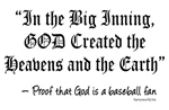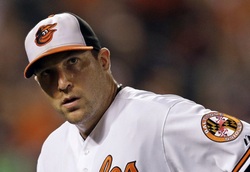There is unlikely to be another Cy Young reliever. Sure, I am taking a chance at being wrong by saying that, but the configuration of the regular season awards has made it difficult for a reliever to be included. The "finalists," are announced shortly before the awards are announced and are described, in other words, "the three players who are allowed to win the award." Think about what the odds are that a player that is not a finalist is up against to have any shot of even getting third place. Narrowing the choices down to three leaves the possibility of a reliever being including pretty slim. Since the award now includes the finalists, there has not been a reliever nominated as a top three in either league. In fact, pitchers Craig Kimbrel of the Braves and Fernando Rodney of the Rays each finished 5th in their respective leagues in the 2012 voting. Kimbrel had as dominant season possible as a strikeout reliever, finishing with an ERA of 1.01 and Rodney had a season only duplicated by Cy Young Award winner Dennis Eckersley in 1992. It is impossible to top the seasons Kimbrel and Rodney had in 2012 so I think it puts in perspective the chances a reliever has of getting the award.
Of course, the odds change if a relief pitcher is nominated as a finalist. But in order to do that, there has to be no more than two starting pitchers that are Cy Young worthy in a given season. If that is not the case, then how does a reliever even get to be a finalist? The days of a Cy Young reliever are becoming nonexistent.
The first relief pitcher to win the Cy Young Award was Los Angeles Dodgers RHP Mike Marshall in 1974. Marshall had a relief season that will likely not be duplicated, especially with today's use of relief pitchers. He pitched in 106 games and had over 200 IP. Sparky Lyle won the AL Award in 1977 off the strength of 13 wins and 26 saves, while pitching well over 100 IP.
HOF Bruce Sutter won the Award in 1979, but you can make a case that Joe Niekro and JR Richard had better seasons. In fact, Sutter did not finish with the most MVP points among pitchers in the NL that season. Another HOF RHP, Rollie Fingers won the AL Award in the strike shortened season of 1981. His numbers stood out more than that of a starting pitcher. Then, of course, there are Willie Hernandez of the 1984 Tigers, Steve Bedrosian of the 1987 Phillies, Mark Davis of the 1989 Padres, Eckersley in 1992 and Eric Gagne of the 2003 Dodgers. Among them, Fingers, Hernandez and Eckersley will hold the distinction of being the only relief pitchers to win both the Cy Young and MVP Award the same season.
The reasons we may have seen the last relief pitcher win the Cy Young Award were stated before, hopefully I made them clear enough. The reason pitchers, mainly starting pitchers, have a chance to win a league's MVP Award is because the writers are not against putting them on the ballot, ala Clayton Kershaw in 2014. Making a pitcher a finalist for an MVP Award means the writers at least have to consider his legitimacy. The same thing that would happen if a relief pitcher is put up as a finalist to win a Cy Young. It is a shame because the importance of good relievers is at an all time high. Unfortunately, it is more important to have multiple very good relievers than just one great one. Teams are aware of that as well as the fact that it is just as important to get the ball to the closer as having a dominant one. Looking back at the past Cy relievers, all of them pitched multiple innings, something we will never see today. Even if we see a pitcher net 80 saves in a season, he is still unlikely to win a Cy Young Award.


 RSS Feed
RSS Feed
